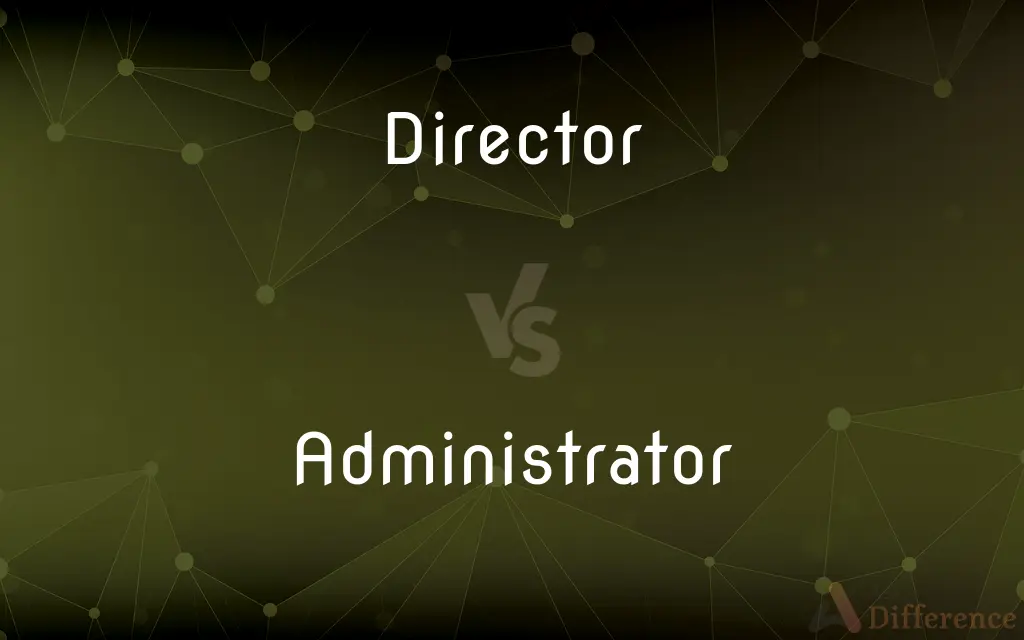Director vs. Administrator — What's the Difference?
By Fiza Rafique & Urooj Arif — Updated on April 19, 2024
A director sets strategic goals and oversees an organization's overall direction, while an administrator manages daily operations and implements policies.

Difference Between Director and Administrator
Table of Contents
ADVERTISEMENT
Key Differences
A director typically holds a top-tier position in an organization, focusing on high-level strategic planning and decision-making. On the other hand, an administrator often works within the framework established by directors to manage day-to-day administrative tasks and operational details.
Directors are involved in setting long-term goals, crafting strategic plans, and making critical business decisions. Administrators, meanwhile, focus on the execution of these plans, ensuring that the organization's daily operations align with strategic objectives.
In many organizations, directors form part of a board or a similar governing body that shapes policies and the overall direction of the organization. In contrast, administrators are usually part of the executive team responsible for implementing these policies and managing the organization's internal affairs.
Directors often interact with external stakeholders, such as investors, partners, and other key entities that influence the organization's future. Administrators, on the other hand, primarily engage with internal stakeholders, such as employees and department heads, to ensure smooth operations.
Directors have a broader impact on an organization’s trajectory and sustainability, focusing on vision and external relations. Conversely, administrators are pivotal in maintaining the organizational structure and efficiency, focusing on internal processes and staff management.
ADVERTISEMENT
Comparison Chart
Position Level
Top-tier, often part of a board
Middle to upper management
Focus
Strategic planning and oversight
Daily operations and execution
Decision-making
Long-term and high impact
Short-term and operational
Stakeholder Interaction
External stakeholders
Internal stakeholders
Main Responsibilities
Setting goals, policy direction
Implementing policies, managing staff
Compare with Definitions
Director
Someone who controls or administers a project or team.
The film director worked closely with actors to perfect each scene.
Administrator
Can serve in various settings like educational institutions, hospitals, and corporate offices.
As an IT administrator, he was responsible for overseeing the network security.
Director
A person who supervises an entire organization or its specific divisions.
The director of the company decided to expand into new markets.
Administrator
Involved in the daily management of staff and resources.
The administrator scheduled a meeting to discuss the department's budget.
Director
In artistic fields, a director is someone who oversees the creative aspects.
The director received critical acclaim for his latest theatrical production.
Administrator
A person responsible for running the business operations of an organization.
The hospital administrator implemented a new patient care system.
Director
A member of the governing body of an organization.
As a director, she participated in all major policy-making decisions.
Administrator
Focuses on efficient operation and maintenance of the organization's systems and facilities.
The office administrator organized all the employee records digitally.
Director
In corporate settings, a director is often part of a group of individuals elected by shareholders to oversee the managerial affairs.
The board of directors met quarterly to discuss the company’s progress.
Administrator
Often handles the bureaucratic aspects of management.
The school administrator updated the curriculum to meet new state regulations.
Director
One that supervises, controls, or manages.
Administrator
A person responsible for carrying out the administration of a business or organization
Hospital administrators
Director
A member of a group of persons chosen to control or govern the affairs of an institution or corporation.
Administrator
A person who dispenses or administers something
Administrators of justice
Director
A person who supervises the creative aspects of a dramatic production or film and instructs the actors and crew.
Administrator
One who administers, especially one who works as a manager in a business, government agency, or school.
Director
The conductor of an orchestra or chorus.
Administrator
(Law) One appointed to administer an estate.
Director
An electronic device that continually calculates and displays information used for firing weapons at moving targets, such as missiles or aircraft.
Administrator
One who administers affairs; one who directs, manages, executes, or dispenses, whether in civil, judicial, political, or ecclesiastical affairs; a manager
Director
One who directs; the person in charge of managing a department or directorate (e.g., director of engineering), project, or production (as in a show or film, e.g., film director).
Administrator
(legal) A person who manages or settles the estate of an intestate, or of a testator when there is no competent executor; one to whom the right of administration has been committed by competent authority
Director
A member of a board of directors.
Administrator
(computing) One who is responsible for software installation, management, information and maintenance of a computer or network
Director
A counselor, confessor, or spiritual guide.
Administrator
One who administers affairs; one who directs, manages, executes, or dispenses, whether in civil, judicial, political, or ecclesiastical affairs; a manager.
Director
That which directs or orientates something.
Administrator
A man who manages or settles the estate of an intestate, or of a testator when there is no competent executor; one to whom the right of administration has been committed by competent authority.
Director
(military) A device that displays graphical information concerning the targets of a weapons system in real time.
Administrator
Someone who administers a business
Director
(chemistry) The common axis of symmetry of the molecules of a liquid crystal.
Administrator
The party appointed by a probate court to distribute the estate of someone who dies without a will or without naming an executor
Director
One who, or that which, directs; one who regulates, guides, or orders; a manager or superintendent.
In all affairs thou sole director.
Administrator
Someone who manages a government agency or department
Director
One of a body of persons appointed to manage the affairs of a company or corporation; as, the directors of a bank, insurance company, or railroad company.
What made directors cheat in South-Sea year?
Director
A part of a machine or instrument which directs its motion or action.
Director
A slender grooved instrument upon which a knife is made to slide when it is wished to limit the extent of motion of the latter, or prevent its injuring the parts beneath.
Director
Someone who controls resources and expenditures
Director
Member of a board of directors
Director
Someone who supervises the actors and directs the action in the production of a show
Director
The person who leads a musical group
Common Curiosities
What is the primary focus of a director?
A director focuses on strategic planning and high-level decision-making within an organization.
How does the role of an administrator differ in educational settings?
In educational settings, administrators manage school operations, student services, and compliance with educational standards.
Who reports to a director?
Senior managers and sometimes administrators report to directors.
What qualifications are typically required for a director?
Directors usually need extensive experience in management or their specific field, often accompanied by higher education qualifications.
What is the difference in decision-making power between a director and an administrator?
Directors make long-term, strategic decisions, whereas administrators make more routine, operational decisions.
Can a director also perform administrative tasks?
While a director can perform administrative tasks, their primary role is governance and strategy.
What are the main responsibilities of an administrator?
An administrator is responsible for managing daily operations, implementing policies, and overseeing staff.
Who does an administrator report to?
Administrators typically report to directors or senior management.
What skills are essential for an administrator?
Key skills for an administrator include organizational, communication, and management skills.
What is the main focus of the Administrator?
The main focus of an administrator is the efficient operation and maintenance of the organization's systems and facilities.
Share Your Discovery

Previous Comparison
Creatine vs. Protein
Next Comparison
Naartjie vs. OrangeAuthor Spotlight
Written by
Fiza RafiqueFiza Rafique is a skilled content writer at AskDifference.com, where she meticulously refines and enhances written pieces. Drawing from her vast editorial expertise, Fiza ensures clarity, accuracy, and precision in every article. Passionate about language, she continually seeks to elevate the quality of content for readers worldwide.
Co-written by
Urooj ArifUrooj is a skilled content writer at Ask Difference, known for her exceptional ability to simplify complex topics into engaging and informative content. With a passion for research and a flair for clear, concise writing, she consistently delivers articles that resonate with our diverse audience.
















































